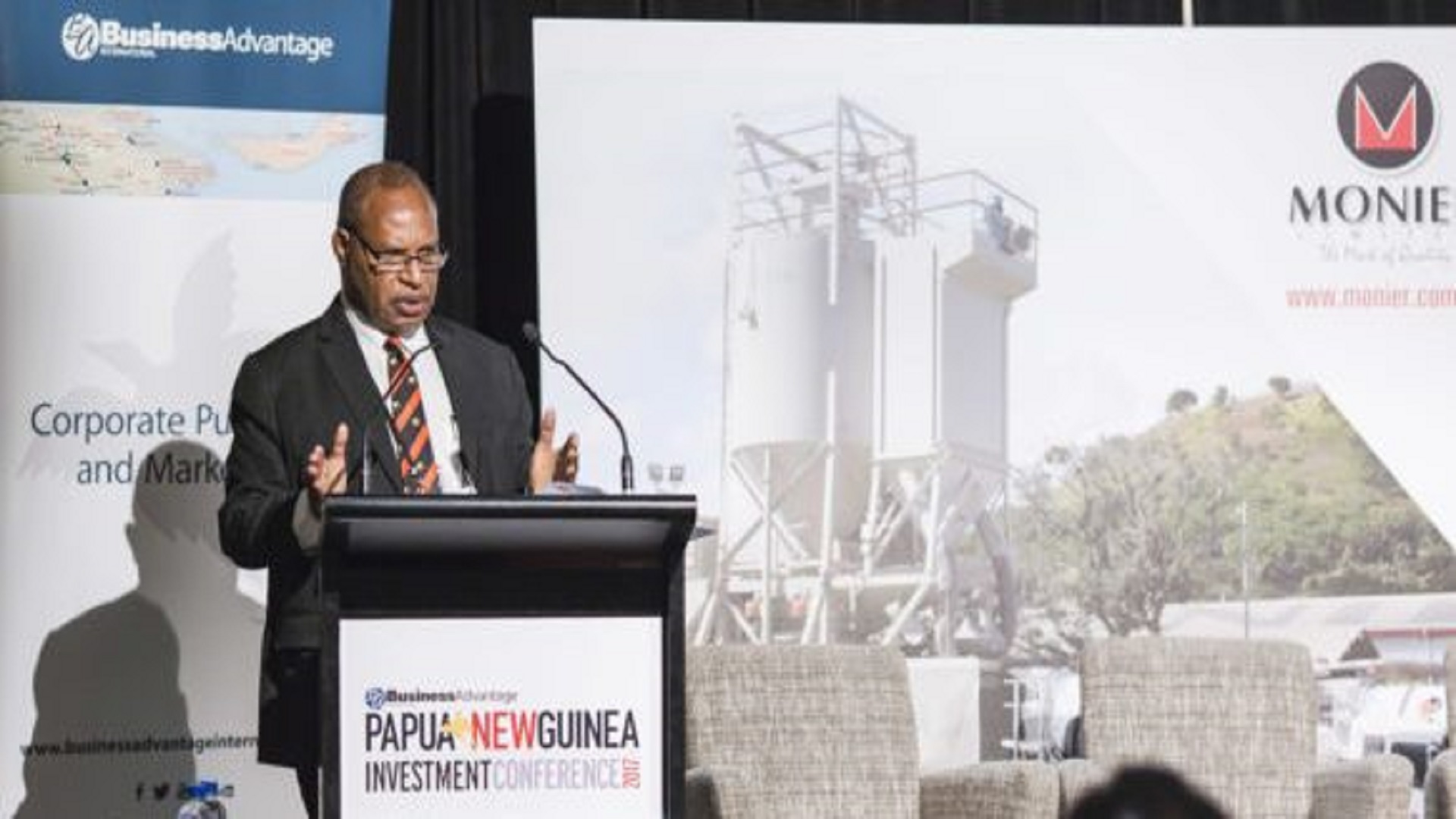In an exclusive interview, Richard Maru, the new Minister for National Planning and Monitoring tells Business Advantage PNG that replacing food imports with domestic production is a priority for the new O’Neill Government. State-owned investment vehicle Kumul Agriculture looks set to play a key role.

Minister Maru addressing the 2017 PNG investment Conference in Sydney
The intent to create a state-owned investment vehicle for agriculture was first flagged in 2015. Maru says the entity will soon start to receive funds to invest in the sector.
‘We will be parking equity funds in our own agricultural investment company to partner [with] local and international investors,’ he tells Business Advantage PNG at the Papua New Guinea Investment Conference in Sydney last week.
Maru says the state-owned enterprise, Kumul Agriculture, will hold all the state’s equity investments in commercial agriculture.
‘This is something we have not done in the past. We will be parking investment funds, starting this year through the Supplementary Budget.’
Imports
The motivation is primarily to reduce PNG’s reliance on food imports.
Maru says that each year PNG imports K3–4 billion in food that it could produce itself. The biggest item is rice, followed by dairy products from New Zealand and chicken feed from Australia.
‘Both human and animal feed is a big issue for us,’ he says. ‘We have very fertile land: great agronomic conditions, good weather and we don’t have too many pests.
‘The focus will be on serving the PNG domestic market.’
‘All the conditions lend themselves to agriculture—unlike countries like Israel, where you have basically a desert.
‘We have water and very fertile land. What we have to do now is to mobilise the land and then find investors who have the technology and the capital to partner us to start investing in commercial agriculture in a very significant way. We need to start replacing imports.’
Markets
Maru says the focus will be on serving the PNG domestic market, and then regional markets.
‘We are open to investors from around the globe who are interested in investing in some of the exciting projects in PNG.
‘We want to attract investors into sectors like coffee and palm oil, which have growth potential not just in terms of the primary production of the crops, but also the processing to final end product.
‘If we meet our own domestic requirements, countries like the Philippines have already indicated they would buy rice from us.’
‘That is a real focus of ours now. We also want to go up the value chain and produce end-product for the global market.’
‘In rice, if we meet our own domestic requirements, countries like the Philippines have already indicated they would buy rice from us. These are mass marketing opportunities.

PNG coffee beans. Credit: AFP
‘In some areas like coffee, yes, it would be a niche because there are so many global brands and we would be looking at bringing one or two partners with an already established international brand to produce and package for that market, which is really a high value market.’
Lessons
Maru says the push for import replacement is important because of the foreign exchange difficulties that are occurring in the wake of the PNG LNG project.
‘We need to re-look at the incentive package that we offer to large-scale resource projects. Do we have to give them accelerate depreciation to the point where in the first three years they are basically taking all the money out?
‘During the boom period, funds should have been re-diverted.’
‘That is one lesson that we have learned. We need to make sure that we have currency inflows from the start of the project, when they go into production rather than trying to service charges and depreciation charges, which are very high.
‘They look after the company and the banks first, and not necessarily the country.’
Sustainable sectors
Maru says during the boom period funds should have been re-diverted and parked in the industries that would replace imports.
‘We should have done that and we haven’t done it. In the nine years when our economy was growing at the rate of 8 per cent we had nine straight years of surplus budgets. The question is: “Where did that money go?”
‘Why didn’t it get employed in investing in sustainable sectors? That is one of the biggest lessons that we have learned.
‘Now, we have our backs against the wall. But we had a lot of money then.’


